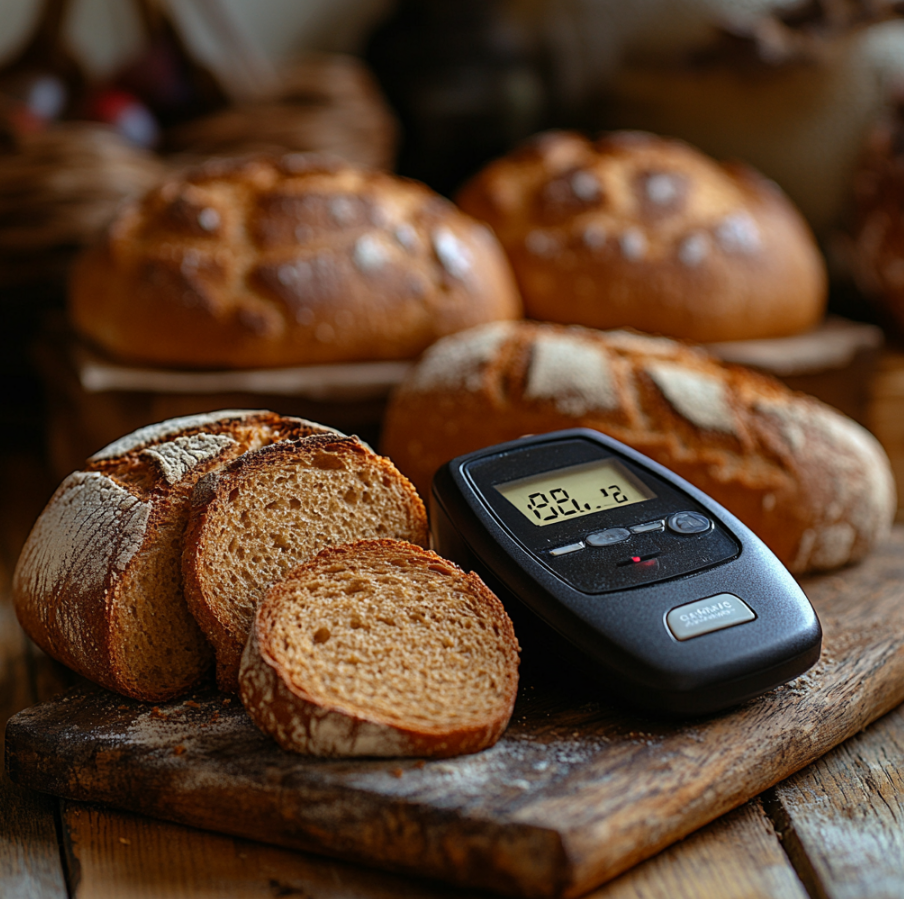Sourdough bread has long been appreciated for its unique flavor and health benefits. But for individuals with diabetes, the big question is: Is sourdough bread a healthy choice for managing blood sugar? This article explores the pros and cons of sourdough bread for diabetics, helping you determine whether it’s a suitable addition to your diet.
- What is Sourdough Bread?
- Nutritional Composition of Sourdough Bread
- Sourdough and Blood Sugar Levels
- Gut Health and Sourdough Bread
- Is Sourdough Bread Gluten-Free?
- Sourdough vs. Other Breads for Diabetics
- Homemade vs. Store-Bought Sourdough
- How to Incorporate Sourdough into a Diabetic-Friendly Diet
- Frequently Asked Questions
- Conclusion
What is Sourdough Bread?
Sourdough bread is different from regular bread because it’s made through a fermentation process that involves wild yeast and bacteria. This process not only gives it its distinct flavor and texture but also breaks down carbohydrates more slowly, potentially making it easier on blood sugar levels.
For more insight into sourdough, you can explore the differences and learn how sourdough bread is different from other types of bread.
Key Features of Sourdough Bread:
- Wild yeast and bacteria aid in fermentation.
- Slower breakdown of carbohydrates due to fermentation.
- Unique tangy flavor and chewy texture.

Nutritional Composition of Sourdough Bread
When examining whether sourdough bread is a good choice for diabetics, its nutritional content plays a significant role. While sourdough bread has some benefits, such as lower glycemic index compared to white bread, it is still high in carbohydrates, which could affect blood sugar levels.
For example, typical sourdough bread brands have the following nutritional values:
- Franz Organic Sourdough: 14g net carbs per slice.
- Pepperidge Farm Sourdough: 24g net carbs per slice.
To learn more about how these types of bread compare, check out the article on whether sourdough bread is healthier than regular bread.
Sourdough and Blood Sugar Levels
One of the biggest advantages of sourdough bread is its lower glycemic index (GI), ranging between 48 and 66, compared to the 70+ GI of traditional white bread. This means sourdough causes a slower rise in blood sugar levels after eating. However, it’s still high in overall carbohydrates, so portion control is key.
Glycemic Benefits of Sourdough Bread:
- Lower glycemic index: Reduces spikes in blood sugar.
- Glycemic load: 8-12, depending on the portion size.
While sourdough might be a better option compared to other breads, it should still be eaten in moderation, especially for diabetics who need to carefully monitor their blood sugar levels.

Gut Health and Sourdough Bread
Sourdough bread’s fermentation process not only influences blood sugar but also supports gut health. The bacteria produced during fermentation can improve digestion and promote the growth of beneficial gut flora.
Benefits for Gut Health:
- Encourages the growth of beneficial gut bacteria.
- May support better digestion and absorption of nutrients.
To dive deeper into the health benefits of sourdough, including its impact on digestion, you can read about how sourdough bread is made and its nutritional value.
Is Sourdough Bread Gluten-Free?
It’s important to clarify that sourdough bread is not gluten-free. Although the fermentation process breaks down some of the gluten proteins, sourdough still contains gluten unless it is specifically made with gluten-free ingredients. For individuals with celiac disease or gluten intolerance, this is a crucial consideration.
Key Points:
- Sourdough contains reduced gluten but is not gluten-free.
- People with gluten sensitivity may tolerate it better, but it’s not safe for celiac disease patients.
Sourdough vs. Other Breads for Diabetics
When comparing sourdough bread to other types of bread, such as white or whole wheat, sourdough often comes out ahead due to its lower glycemic index and slower digestion. However, it’s not the “miracle bread” some claim it to be.
Comparisons:
- White bread: High GI, quickly raises blood sugar.
- Whole wheat bread: Slightly better in fiber but still high in carbs.
- Sourdough: Lower GI, more beneficial for blood sugar control.
If you’re interested in other healthy bread options, consider learning more about artisan Italian bread, which can also be a nutritious choice.
Homemade vs. Store-Bought Sourdough
Making homemade sourdough bread is a healthier option as it allows you to control the ingredients and avoid preservatives. Store-bought sourdough often contains additives and higher carbohydrate content, which may negatively impact blood sugar levels.
Homemade Sourdough Benefits:
- Fewer preservatives and additives.
- More control over carbohydrate content.
For those who enjoy baking at home, try experimenting with different sourdough recipes to find the one that best suits your dietary needs.
How to Incorporate Sourdough into a Diabetic-Friendly Diet
While sourdough bread has some health benefits, the key to incorporating it into a diabetic-friendly diet is moderation and balancing it with other nutrients. Here are some tips:
Tips for Eating Sourdough:
- Portion control: Stick to one slice per meal.
- Pair with protein: Combine sourdough with protein-rich foods like eggs or lean meats to slow down digestion.
- Add fiber: Include fiber-rich vegetables to help stabilize blood sugar levels.
Monitoring blood sugar after meals can also help determine how well sourdough fits into your diet.
Frequently Asked Questions
Can diabetics eat sourdough bread daily?
Yes, but portion control is critical. Stick to small portions and monitor blood sugar levels.
Is sourdough bread better than whole wheat bread for diabetics?
Sourdough typically has a lower glycemic index, but both should be consumed in moderation to avoid blood sugar spikes.
Does sourdough bread lower blood sugar?
While it doesn’t lower blood sugar, sourdough can result in a slower rise in blood sugar compared to other breads.
Is homemade sourdough better than store-bought for diabetics?
Yes, homemade sourdough allows for better control over ingredients and is typically lower in preservatives.
Conclusion
In conclusion, sourdough bread can be a good option for diabetics due to its lower glycemic index and positive impact on gut health. However, it’s important to consume it in moderation and monitor blood sugar levels. Homemade sourdough offers more control over ingredients, making it a healthier option compared to store-bought varieties .

